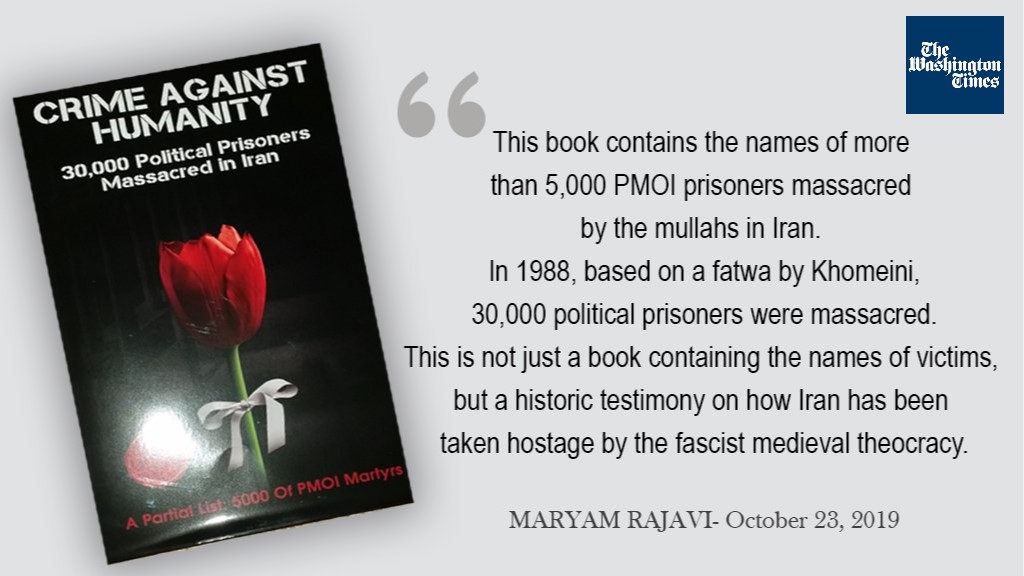
![MEK leader Maryam Rajavi called for a “firm European policy which necessarily requires lending support to the Iranian people’s resistance [in order] to establish democracy and popular sovereignty” in Iran Maryam Rajavi, presented a book titled “Crime Against Humanity” to a conference held at the European Parliament in Strasbourg on Wednesday October 23, 2019 on Iran.](https://stopfundamentalism.com/wp-content/uploads/2019/October/Iran-1988-Massacre-MEK-members-800.jpg)
By Azita Carlson
A conference was held at the European Parliament in Strasbourg on Wednesday, October 23, 2019 On Iran’s 1988 Massacre of 30.000 political prisoners, mostly members of the People’s Mojahedin Organization of Iran (PMOI/MEK Iran).
A large number of MEPs from various political groups attended the meeting which was organized by Friends of a Free Iran inter-parliamentary group.
Mrs. Maryam Rajavi, the President-Elect of the National Council of Resistance of Iran, who was the keynote speaker of the conference, presented a book titled “Crime Against Humanity”. This book lists the names of more than 5,000 MEK members reportedly killed by the Iranian regime 31 years ago. The book also details the 35 commissions that carried out the massacre and lists the locations of three dozen mass graves in Iran.
“The Mujahedin-e Khalq, or MEK Iran, has emerged as a leading expatriate dissident group battling the Iranian regime. The book released Wednesday claims that as many as 30,000 political prisoners and opposition figures were killed in Iran in 1988,” reported The Washington Times on October 23, 2019.
Crime against Humanity is a book containing the names of over 5,000 victims of the #1988massacre in #Iran, also addresses of the tombs & mass graves in 36 cities, names of members of 35 Death Commissions, & lists 110 cities where the massacre was carried out. pic.twitter.com/P8iJqAzXJo
— Maryam Rajavi (@Maryam_Rajavi) 27 oktober 2019
“Maryam Rajavi, called for a “firm European policy which necessarily requires lending support to the Iranian people’s resistance [in order] to establish democracy and popular sovereignty in Iran,” wrote The Washington Times.
The report said Mrs. Rajavi warned the European Parliament on recent events related to Iran, which include confrontation with tankers passing through the Strait of Hormuz and an attack on a major petroleum refinery in Saudi Arabia, and emphasized that it is proof that her warning to the European Parliament two years ago where she “warned then that ‘if the ruling religious fascism in Iran is not dealt with decisively, they will impose a fatal war on the region and the world’” was coming true.
The EU must condition every trade and tie with the Iranian regime on end to executions and torture in #Iran. #1988Massacre #NoImpunity4Mullahs #FreeIran pic.twitter.com/X4SC45Efz2
— Maryam Rajavi (@Maryam_Rajavi) 23 oktober 2019
Mrs. Rajavi called for a firm policy by the European Union:
– The EU must condition all trade and ties with the Iranian regime to an end of executions and torture in Iran.
– The dossier of the massacre of political prisoners must be referred to the UN Security Council and international courts, and the perpetrators should face justice.
– The world community, especially the European Union, must recognize the Iranian people’s right to resist and change the clerical regime, and to establish democracy and human rights in Iran.
Members of the European Parliament from different political groups strongly condemned the grave human rights violations in Iran and commended the Iranian resistance on its unwavering struggle to inform the world about the mullahs’ shocking conduct at home and abroad. They expressed their support for Mrs. Rajavi’s movement and her 10-point platform for a secular, democratic Iran.
The MEPs stressed the need for the EU to put the issue of human rights at the core of its policy vis-a-vis the Iranian regime and underscored that resistance against the ruling religious dictatorship in Iran is the right of the Iranian people.







